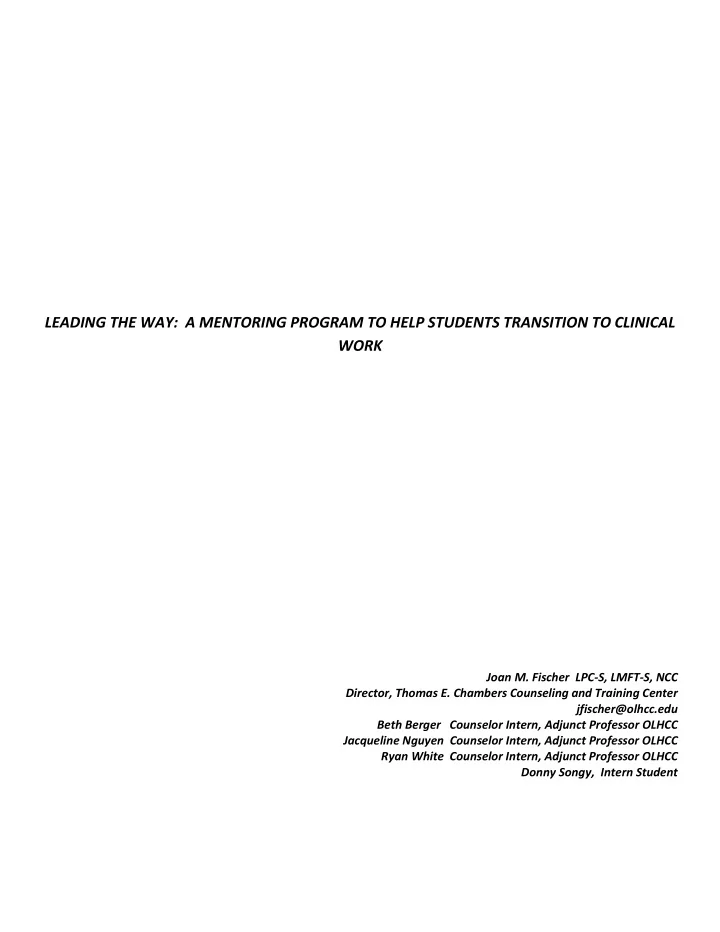

LEADING THE WAY: A MENTORING PROGRAM TO HELP STUDENTS TRANSITION TO CLINICAL WORK Joan M. Fischer LPC-S, LMFT-S, NCC Director, Thomas E. Chambers Counseling and Training Center jfischer@olhcc.edu Beth Berger Counselor Intern, Adjunct Professor OLHCC Jacqueline Nguyen Counselor Intern, Adjunct Professor OLHCC Ryan White Counselor Intern, Adjunct Professor OLHCC Donny Songy, Intern Student
Leading the Way Program Description Components of the program: Summer 2012 1. Met as needed 2. Students watched mentor’s videos 3. Mentors checked files Fall 2012 1. Added, formalized content 2. 1 st session handout, verbal skills handouts Spring 2013 1. Each mentor watched three of each mentees videos and gave feedback 2. Regularly scheduled meetings 3. Developed evaluation process 4. Added demonstration with techniques students (handout) Summer 2013 1. Meet weekly 2. Watch videos regularly 3. 50 minute role play with technique students Future Directions: giving/receiving feedback Evaluation (handouts) Training mentors (handouts) Personal reflection of a mentee turned mentor
Mentoring Program The mentoring program was initially conceived as an outgrowth of informal discussions among senior counseling students and the director of the counseling center. Two concerns arose: the increasing number of students seeing clients in the counseling center as well as the increasing demands on the director’s time which limited access for consultation with students other than by appointment. Four interns were initially identified as potential mentors. Criteria for selection included: demonstration of excellent counseling skills, demonstration of well-developed positive interpersonal skills, demonstration of the ability to give constructive feedback, and availability for consultation with students for 20+ hours per week. Initial guidelines for the mentoring program were developed collaboratively by the center director, the identified mentors, and the practicum students (mentees). It was emphasized that the mentors served in a supportive, not supervisory, capacity. Initial guidelines included: Mentors would meet weekly with assigned mentees. Beginning sessions would focus on the “professional responsibility” items on the practicum evaluation form as well as the “observation/supervision discussion guide”. Guide students to focus on process of counseling rather than content. Each mentor is responsible for keeping a record of meeting dates and content. The director will meet with mentors at least monthly, more frequently if needed. The mentoring program began in the Summer, 2012, session. Verbal comments from practicum students indicate that the program helped them feel more connected to the center, gave them access to immediate answers to questions, and generally reduced anxiety. During this third semester, the program has been expanded to include a role play video demonstration with students enrolled in the techniques class. In addition, mentors are engaging with their mentees in guided viewing and discussion of client sessions. We have developed a formal evaluation process of the program.
Verbal Skills Practice Give an example of each and briefly describe when it may be appropriate to use with a client. Open-ended question: Closed question: Interpretation: Reframe or relabeling: Affirmation: Circular question: Confrontation: Reflection: I-message: Summarization: Personal disclosure: Clarification: Humor: Empathy: Statement: Are there any verbal techniques you would never use?
Techniques Skill Practice Client supportive verbal skills (affirmation, unconditional positive regard, empathy, use of silence, reframing, etc.): Content clarification verbal skills (confrontation, summarization, reflection, I message/active listening, clarification, questions, etc.): Goal-setting (simple, measurable, attainable, positive, specific, observable, etc.): Body language (counselor or client): Room arrangement:
Techniques Skill Practice (2) Theory specific strategies: ____miracle question ___exceptions ___dramatizing/exaggerating ___scaling (just noticeable difference) ___maintaining/keep it from getting worse ___A B C D E ___thinking error analysis (all or nothing, awfullizing, musterbation, etc.) ___ERP (exposure, response prevention) ___experiments ___A, B, C (antecedent, behavior, consequence) ___contracts, charts, etc. ___genograms, lifestyle assessment, emotional mapping ___schemas, private fiction ___paradox, antisuggestion, prescribing the symptom ___spitting in the soup ___creating direct experience (2 chair work, etc.) ___dream work ___psychoeducation/teaching ___kinesthetic work (sculpting, etc.) ___role play ___enactments
Techniques Skill Practice (3) ___directive play therapy ___non-directive play therapy ___mindfulness ___distress tolerance ___interpersonal effectiveness ___emotional regulation ___relationship building ___recovery plan ___relapse prevention plan ___safety plan ___free association ___ relaxation training ___behavior rehearsal ___WDEP ___bibliotherapy ___art/music ___directives ___externalization ___alternative stories ___other
Name: Date: Rubric for Reflection on Session Participation 1. What were your feelings about this assignment? (1 point) 2. As you left the session, what did you take with you? (2 points) 3. What behaviors of the counselor were most helpful? (2 points) 4. What words or language were most helpful? (2 points) 5. General comments: (.5 point) Pay attention to: empathy, listening, process/not content, intentionality, ORS and SRS, person-centered skills
Name (optional):_______________________ Date of mentoring experience: ___Spring 2012 ___ Fall 2012 ___ Spring 2013 ___ Summer 2013 Mentoring Experience Evaluation The mentoring program was developed in an effort to improve the practicum experience for students by giving them additional access to information, suggestions, and feedback. Please respond to the following items by circling the number that best reflects your experience with 1 representing the lowest score and 5 representing the most favorable experience. 1. My mentor was available to me on a consistent basis throughout the semester. 1 2 3 4 5 2. My mentor provided helpful instruction/support on paperwork and file maintenance. 1 2 3 4 5 3. My mentor provided support/direction for case conceptualization. 1 2 3 4 5 4. My mentor provided support/feedback on my session videos. 1 2 3 4 5 5. My mentor provided guidance in professional identity development (organizations, conference attendance, professional resources, etc.). 1 2 3 4 5 6. My mentor served as a support rather than as a supervisor. 1 2 3 4 5 7. Overall, I was satisfied with the mentor program. 1 2 3 4 5 8. I took advantage of the mentor program and made time available for participation in meetings with my mentor. 1 2 3 4 5 Comments/suggestions:
Recommend
More recommend